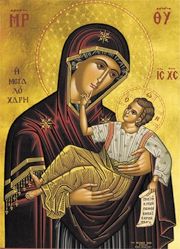Christ is Born! Glorify Him!
 Thy Nativity, O Christ our God, has given rise to the light of knowledge in the world, for by it those who worshipped the stars were taught by a star to worship You, O Sun of Righteousness, and to know You as the Daybreak from on high, O Lord, glory to You!
Thy Nativity, O Christ our God, has given rise to the light of knowledge in the world, for by it those who worshipped the stars were taught by a star to worship You, O Sun of Righteousness, and to know You as the Daybreak from on high, O Lord, glory to You!(Troparion for the Nativity of Christ)
REFLECTIONS ON THE NATIVITY OF OUR LORD, GOD AND SAVIOR JESUS CHRIST
From the Nativity homily of St. John Chrysostom, Archbishop and Patriarch of Constantinople, 354-407 AD
I behold a new and wondrous mystery. My ears resound to the Shepherds' song, piping no soft melody, but chanting full forth a heavenly hymn. The Angels sing. The Archangels blend their voice in harmony. The Cherubim hymn their joyful praise. The Seraphim exalt His glory. All join to praise this holy feast, beholding the Godhead here on earth, and man in heaven. He Who is above, now for our redemption dwells here below; and he that was lowly is by divine mercy raised.
Bethlehem this day resembles heaven; hearing from the stars the singing of angelic voices; and in place of the sun, enfolds within itself on every side, the Sun of Justice. And ask now how; for where God wills, the order of nature yields. For He willed, He had the power, He descended, He redeemed; all things move in obedience to God.
But what shall I say? What shall I utter? Behold an infant wrapped in swaddling clothes and lying in a manger. Mary is present, who is both Virgin and Mother, Joseph is present, who is called father. He is called husband, she is called wife. The names indeed are lawful, but there is no other bond. We speak here of words, not of things. He was espoused to her, but the Most High overshadowed her. Hence, Joseph, doubting, knew not what to call the Infant. He would not dare to say that It was conceived in adultery; he could not speak harshly against the Virgin; he shrank from calling the Child his own. He knew well that here was something unknown to him; how or whence was this Child born? And being anxious because of this, there came to him a message, by the voice of an angel, which said: Fear not to take unto thee Mary thy wife, for that which is conceived in her, is of the Holy Spirit.
(from www.antiochian.org)

